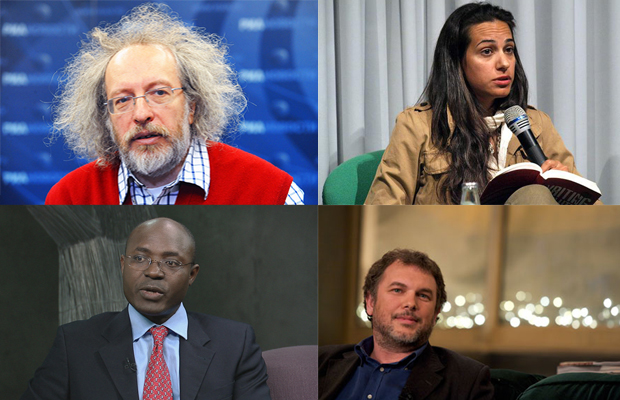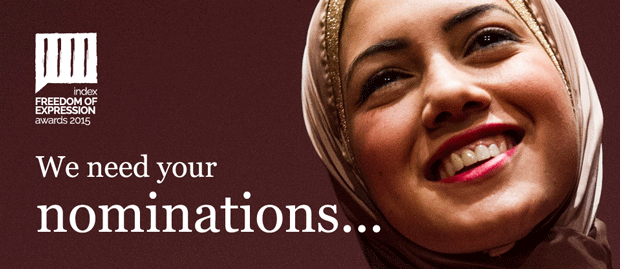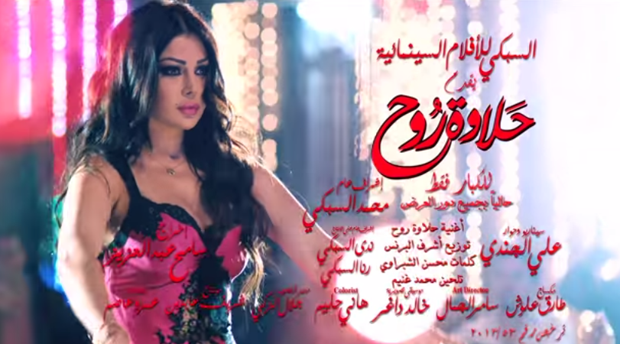17 Feb 2015 | Awards

This week we will be showcasing our shortlisted nominees from the journalism category. This year’s nominees include Lirio Abbate, an Italian journalist whose investigations into the mafia mean he requires round-the-clock police protection; Safa Al Ahmad, whose documentary exposed details of an unreported mass uprising in Saudi Arabia; radio station Echo of Moscow, one of Russia’s last remaining independent media outlets; and Rafael Marques de Morais, an Angolan reporter repeatedly prosecuted for his work exposing government and industry corruption.
Tuesday: Documentary maker Safa Al Ahmad
Wednesday: Investigative journalist Lirio Abbate
Thursday: Journalist and human rights activist Rafael Marques de Morais
Friday: Radio station Ekho Moskvy
In 2014 Azerbaijani newspaper, Azadliq, picked up the award for this category. In the past, winners have included Greek investigative journalist Kostas Vaxevanis; Idrak Abbasov, Azerbaijan; Egyptian editor, Ibrahim Eissa; Radio La Voz, Peru; Ski Lankan newspaper The Sunday Leader; Arat Dink, editor of Turkey-based Armenian newspaper, Agos; Egyptian blogger Abdul Kareem Suleiman Amer; Sihem Bensedrine, Tunisia; Sumi Khan, Bangladesh; and Pulitzer Prize winning photo-journalist Kaveh Golestan, who was killed by a landmine in Northern Iraq in 2003.
In 2003, internationally recognised journalist Fergal Keane was the first to win an award under the journalism category, however, the previous year Russian journalist Anna Politkovskaya, who was killed in 2006, won the Defence of Free Expression award. In 2001 the same award was given to Iranian journalist, Mashallah Shamsolvaezin.
15 Oct 2014 | Press Releases, Uncategorized

- Awards honour journalists, campaigners and artists fighting censorship globally
- Judges include journalist Mariane Pearl and human rights lawyer Sir Keir Starmer
- Nominate at www.indexoncensorship.org/nominations
Beginning today, nominations for the annual Index on Censorship Freedom of Expression Awards 2015 are open. Now in their 15th year, the awards have honoured some of the world’s most remarkable free expression heroes – from Israeli conductor Daniel Barenboim to Syrian cartoonist Ali Farzat to education activist Malala Yousafzai.
The awards shine a spotlight on individuals fighting to speak out in the most dangerous and difficult of conditions. As Idrak Abbasov, 2012 award winner, said: “In Azerbaijan, telling the truth can cost a journalist their life… For the sake of this right we accept that our lives are in danger, as are the lives of our families. But the goal is worth it, since the right to truth is worth more than a life without truth.” Pakistani internet rights campaigner Shahzad Ahmad, a 2014 award winner, said the awards “illustrate to our government and our fellow citizens that the world is watching”.
Index invites the public, NGOs, and media organisations to nominate anyone they believe deserves to be part of this impressive peer group: a hall of fame of those who are at the forefront of tackling censorship. There are four categories of award: Campaigner (sponsored by Doughty Street Chambers); Digital Activism (sponsored by Google); Journalism (sponsored by The Guardian), and the Arts. Nominations can be made online via http://www.indexoncensorship.org/nominations
Winners will be flown to London for the ceremony, which takes place at The Barbican on March 18 2015. In addition, to mark the 15th anniversary of the Freedom of Expression awards, Index is inaugurating an Awards Fellowship to extend the benefits of the award. The fellowship will be open to all winners and will offer training and support to amplify their work for free expression. Fellows will become part of a world-class network of campaigners, activists and artists sharing best practice on tackling censorship threats internationally.
Jodie Ginsberg, CEO of Index, said: “The Index Freedom of Expression Awards is a chance for those whom others try to silence to have their voices heard. I encourage everyone, no matter where they are in the world, to nominate a free expression hero.”
The 2015 awards shortlist will be announced on January 27th 2015. Judges include journalist Mariane Pearl and human rights lawyer Sir Keir Starmer. The public will be asked to participate in selecting the winner of the Google Digital Activism award through a public vote beginning January 27th 2015. Sir Keir said: “Freedom of expression is part of the bedrock of civilised, democratic society. The Index on Censorship Awards have a material influence on promoting such freedom and both celebrating and protecting those who fight against censorship worldwide. That’s why Doughty Street Chambers chooses Index as its principal charity.”
For more information please contact David Heinemann: [email protected]
_______________________________________________________________________
NOTES FOR EDITORS
About Index on Censorship:
Index on Censorship is an international organisation that promotes and defends the right to freedom of expression. The inspiration of poet Stephen Spender, Index was founded in 1972 to publish the untold stories of dissidents behind the Iron Curtain and beyond. Today, we fight for free speech around the world, challenging censorship whenever and wherever it occurs. Index believes that free expression is the foundation of a free society and endorses Article 19 of the Universal Declaration of Human Rights, which states: “Everyone has the right to freedom of opinion and expression.”
About The Index on Censorship Freedom of Expression Awards:
The Index Freedom of Expression Awards recognise those deemed to be making the greatest impact in tackling censorship in their chosen area.
Awards categories:
Journalism – for impactful, original, unwavering journalism across all media (sponsored by The Guardian).
Campaigner – for campaigners and activists who have fought censorship and who challenge political repression (sponsored by Doughty St Chambers).
Digital Activism – for innovative uses of new technology to circumvent censorship and foster debate (sponsored by Google).
Arts – for artists and producers whose work asserts artistic freedom and battles repression and injustice.
Previous award winners include:
Journalism: Azadliq (Azerbaijan), Kostas Vaxevanis (Greece), Idrak Abbasov (Azerbaijan), Ibrahim Eissa (Egypt), Radio La Voz (Peru), Sunday Leader (Sri Lanka), Arat Dink (Turkey), Kareen Amer (Egypt), Sihem Bensedrine (Tunisia), Sumi Khan (Bangladesh), Fergal Keane (Ireland), Anna Politkovskaya (Russia), Mashallah Shamsolvaezin (Iran)
Digital/New Media: Bassel Khartabil (Palestine/Syria), Freedom Fone (Zimbabwe), Nawaat (Tunisia), Twitter (USA), Psiphon (Canada), Centre4ConstitutionalRights (US), Wikileaks
Advocacy: Malala Yousafzai (Pakistan), Nabeel Rajab (Bahrain), Gao Zhisheng (China), Heather Brooke (UK), Malik Imtiaz Sarwar (Malaysia), U.Gambira (Burma), Siphiwe Hlope (Swaziland), Beatrice Mtetwa (Zimbabwe), Hashem Aghajari (Iran)
Arts: Zanele Muholi (South Africa), Ali Farzat (Syria), MF Husain (India), Yael Lerer/Andalus Publishing House (Israel), Sanar Yurdatapan (Turkey)
You have received this email because email address ‘[email protected]’ is subscribed to ‘AWARDS 2015 Call For Nominations’.
23 Apr 2014 | Egypt, Middle East and North Africa, News and features

A shot from the trailer of Halawet Rooh (Image: Mohamed Elsobky/YouTube)
Just as Egyptian free expression advocates were celebrating the decision by Egypt’s State Censorship Board to allow the screening of Darren Aronofsky’s Biblical epic Noah, news of the withdrawal of Lebanese diva Haifa Wehbe’s new film Halawet Rooh (Beauty of the Soul) from theatres in Egypt put a damper on their cautiously optimistic mood. The fact that the decision to suspend the screening of the controversial film was made by interim Prime Minister Ibrahim Mehleb — rather than by the censors — has added fuel to the fire.
On Wednesday, the premier ordered the film to be removed from cinemas and sent back to the State Censorship Board for re-evaluation. The move led Ahmed Awad, the head of the State Censorship Board to tender his resignation, saying he was “not consulted” and categorically rejects government interference in his work.
Former Culture Minister Emad Abu Ghazy reminded the prime minister of a court ruling forbidding interference in the work of the independent censorship board. “The Premier has no right to suspend the screening of the film,” Abu Ghazy told AFP.
Popular TV talk show host Ibrahim Eissa meanwhile, cautioned that the ban does not auger well for freedom of expression.”Those who ban films today for damaging public morality will in future, ban films for political reasons,” he warned in an episode of his show “Hunna Al Kahera” broadcast on the privately owned CBC Channel.
Rights activists and groups have also expressed concern over the suspension of the film’s screening, saying the move is part of a wider clampdown on artistic expression in Egypt. In his column in Saturday’s edition of the independent newspaper Al-Shorouq, film critic Kamal Ramzy chided the government for not having learnt history’s lessons on censorship. “Instead of focusing on problems of corruption and the rule of law, the prime minister is instead, more occupied with censorship,” he lamented.
Mehleb meanwhile, downplayed the criticism levelled at him. At a meeting with intellectuals and literary figures on Saturday, he insisted that “there is a clear cut distinction between freedom of artistic expression and creativity on the one hand, and infringement on moral values on the other”.
The premier’s decision to suspend the screening of the film came in the wake of an outcry from conservatives in Egypt who denounced the film on social media networks as “obscene” and “a threat to public morality”. Oddly enough, some “liberal” Egyptians too, have joined the online campaigns accusing Ahmed El Sobky, the film’s producer of “destroying an entire generation” and being “more dangerous than bombs and missiles”. El Sobky’s trademark films are often “low quality” productions characterised by a mix of violence, belly dancing and sexually explicit scenes. His target audience are generally the uneducated, low income youth who traditionally celebrate public holidays by going to the cinema.
Film critics have also decried the film as “sexually provocative,” lambasting lead actress Haifa for “revealing too much flesh”. “There is hardly a scene in which Haifa does not appear half nude,” scoffed critic Ramy Abdel Razak in his review published Thursday in the independent daily Al Masry El Youm.
Critics question how a particularly steamy scene in which Haifa’s clothes are ripped off by a rapist, got past the State Censor board. Overlooking the fact that the film was rated “Adults Only” — which meant it was inaccessible to children under 16 — Egypt’s National Council for Childhood warned in a statement released last week, that the film was “harmful to minors” and “violates public morality”.
The “raunchy” film had been in cinemas for two weeks before it was removed and had reportedly grossed some £84,100 in its first week in theatres. At the time of publication, a two-minute trailer for the film on YouTube had over 3,6 million views.
Described by critics as a “poor imitation of Italian director Giuseppe Tornatore’s widely-acclaimed Malena”, the film tells the story of a young boy’s obsession with a beautiful nightclub singer. The woman, whose husband is abroad, is pursued by the men in her working class neighbourhood and her ardent young admirer subsequently takes it upon himself to protect her.
Fifteen year-old Karim El Abnoudi, who plays the role of the boy infatuated with Rooh, has reportedly been verbally harassed at his school and on the streets, with his classmates and some laymen — angered by what they had read or heard about the film — hurling insults at him and calling him “an infidel”.
The withdrawal of the film from theatres has fuelled fears among some secularists and rights organisations that increased censorship is stifling freedom of artistic expression and creativity in Egypt. In March, the State Censorship Board banned 20 music videos from Egyptian TV Channels for allegedly containing “explicit content”. In another sign that the interim government is putting the lid on artistic expression, a misdemeanour court in the Southern Egyptian province of Bani Suef in March upheld a verdict against Egyptian author and rights activist Karam Saber, who eight months earlier had been sentenced in absentia to five years in prison and LE1000 in bail for “blasphemy”. In June 2013. Saber was convicted on charges of “contempt of religion” and “inciting sedition” in a collection of short stories he wrote two years earlier titled Where is God? Both Al Azhar (the country’s highest Islamic authority ) and the Coptic Orthodox Church had earlier concurred in the opinion that the book was “blasphemous” and “ought to be banned”.
In a joint statement released in September (in the wake of the sentence handed down to Saber), 46 Arab Human Rights Organisations expressed concern for the diminishing space for free artistic expression and creativity. The Arab Network for Human Rights Information also said the verdict against Saber “belies any notion of respect for human rights by the state and violates provisions in the new constitution guaranteeing freedom of creativity and artistic expression”.
A provision in the new charter, endorsed by an overwhelming 98% of voters in a popular referendum in January, guarantees freedom of thought and opinion stipulating that any individual “has the right to express his opinion and to publicise it verbally or in writing or by other means”. Another provision in the 2014 constitution guarantees freedom of literary and artistic creation, stating that “the state shall promote art and literature, sponsor creators and protect their creations, providing the necessary means to achieve this”.
Many artists and writers had joined the mass protests in January 2011, hoping that the revolution would bring an end to decades of repression. For a short period after the fall of authoritarian president Hosni Mubarak, Egypt’s artists and literary figures capitalised on their new-found freedoms, tackling subjects long off limits to them — like sex and religion.The rise of Islamists to power in 2012 , however brought new limitations to the short-lived free flow of artistic and creative expression. New legislation was introduced by the Islamist-dominated parliament, banning art with obvious sexual references as well as concerts featuring female singers. The downfall of the Muslim Brotherhood regime in July 2013 rekindled hopes for an end to censorship and suppression of creativity. But in the new restrictive cultural atmosphere — reminiscent of the Mubarak era — these hopes have been quickly dashed, giving way to disappointment, frustration and fear.
“It is ironic that the ban on Wehbe’s film would come from the interim government that replaced the ousted Islamist regime,” prominent blogger Zeinobia wrote last week. Many of the liberal Egyptians who joined the uprising against the Muslim Brotherhood president in July last year had said they were protesting against “religious fascism” and had hoped the new government would be secular and more democratic.
“The interim government has demonstrated that it is more Islamic than the Islamists,” lamented Sameh Kassem, culture editor at the independent Al Bawabh news website .
“The withdrawal of Wehbe’s film from theatres and the verdict against Saber are attempts by the interim government to appease the ultra-orthodox Salafis ahead of presidential elections scheduled on 28 and 29 May,” he told Index.
Egypt’s Salafis, the ultra-conservative Islamist movement that had initially backed ousted Muslim Brotherhood President Mohamed Morsi, later decided to side with the military and lent its support to the military-backed interim government after his deposition.
“The military-backed authorities are trying to woo the Salafis to guarantee their votes for former military chief Abdel Fattah El Sisi in the upcoming elections,” Kassem said.
This article was originally posted on 22 April 2014 at indexoncensorship.org




